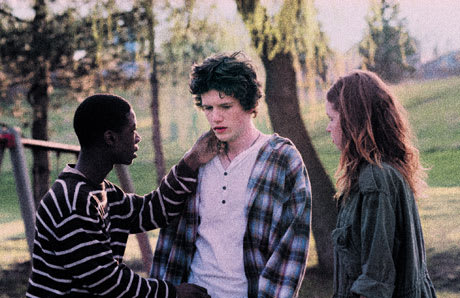In one way or another, each one of the shorts in this program addresses the nature of home and family around the world. Mostly, they tackle imbalances and less traditional family units, occasionally delving into the wonderful world of white trash or illegitimate children, but the overall theme remains throughout, often focusing on children and their experiences with growing up.
First up is the aforementioned white trash short, Liar, where two sisters of different races (low income folks with different fathers, both of whom presumably didn't stay around long after conception) seek out an ex-boyfriend to confront him and his claim of homosexuality. While it captures the dynamics of small town, community housing life, there isn't a great deal of complexity to the narrative, much like Hellion, wherein three trailer park brothers tie up their babysitter and wreak havoc. It has an Overboard vibe, only without the creepy kidnapping, rape implications or the irrepressible Goldie Hawn.
Long Distance Information features a phone call between a depressed younger man and the typically surly Peter Mullan, which takes a turn when an identity is mistaken. It's mostly forgettable, unlike the more involved Turbulence. This Tunisian exploration of orthodoxy and female subjugation follows a young woman that comes home from a party beaten, hesitant to reveal the details. Focused more on how the family and community react than the victim, this short captures the discomforting role of women in traditionalist locales.
On the animation front, Lack of Evidence tells one side of the story ― a potential fictional tale ― about a Nigerian immigrant denied refugee status despite having an elaborate tale of a life-threatening family dynamics. With simple but experimental animation, it waxes sanctimonious about the subject, conveniently ignoring less politically viable realities about Nigerian industry and import/export.
The other animated short in the program, Belly, is quite touching, following a young boy and two friends through a life-threatening experience, only to deliver a message about the pain of letting go of the past and youth. It's far more effective than the thematically similar Me Without You, which shows a nine-year-old struggling to cope after his sister goes on an exchange trip to Japan.
And lastly, Little Brother takes standard live action and mixes it with experimental movement while showing the dynamic between an older brother with a hearing aid and his younger, wheelchair-bound, mentally handicapped sibling. Oddly enough, it shows the solace the older brother finds in turning off his hearing aid and, metaphorically, the demands of the outside world.
First up is the aforementioned white trash short, Liar, where two sisters of different races (low income folks with different fathers, both of whom presumably didn't stay around long after conception) seek out an ex-boyfriend to confront him and his claim of homosexuality. While it captures the dynamics of small town, community housing life, there isn't a great deal of complexity to the narrative, much like Hellion, wherein three trailer park brothers tie up their babysitter and wreak havoc. It has an Overboard vibe, only without the creepy kidnapping, rape implications or the irrepressible Goldie Hawn.
Long Distance Information features a phone call between a depressed younger man and the typically surly Peter Mullan, which takes a turn when an identity is mistaken. It's mostly forgettable, unlike the more involved Turbulence. This Tunisian exploration of orthodoxy and female subjugation follows a young woman that comes home from a party beaten, hesitant to reveal the details. Focused more on how the family and community react than the victim, this short captures the discomforting role of women in traditionalist locales.
On the animation front, Lack of Evidence tells one side of the story ― a potential fictional tale ― about a Nigerian immigrant denied refugee status despite having an elaborate tale of a life-threatening family dynamics. With simple but experimental animation, it waxes sanctimonious about the subject, conveniently ignoring less politically viable realities about Nigerian industry and import/export.
The other animated short in the program, Belly, is quite touching, following a young boy and two friends through a life-threatening experience, only to deliver a message about the pain of letting go of the past and youth. It's far more effective than the thematically similar Me Without You, which shows a nine-year-old struggling to cope after his sister goes on an exchange trip to Japan.
And lastly, Little Brother takes standard live action and mixes it with experimental movement while showing the dynamic between an older brother with a hearing aid and his younger, wheelchair-bound, mentally handicapped sibling. Oddly enough, it shows the solace the older brother finds in turning off his hearing aid and, metaphorically, the demands of the outside world.
